Division Attempts and Trials from the Venezuelan Left: A Journey of Two Decades


Orinoco Tribune – News and opinion pieces about Venezuela and beyond
From Venezuela and made by Venezuelan Chavistas

By Mision Verdad – Aug 27, 2020
In the next parliamentary elections, the Communist Party of Venezuela (PCV) and factions of Patria Para Todos (PPT) linked to the former secretary general of that party, Rafael Uzcátegui, will not participate as allies of the Great Patriotic Pole (GPP), the Chavista electoral alliance.
Under the cover of the PCV (since an ad hoc board was appointed in the PPT — at the request of its members — which does propose to ally with the GPP) a sector of the Venezuelan left is offering “independent” candidates, ignoring the calls the Venezuelan government has sent out to keep unified and recover the National Assembly, a space that for five years has served anti-Chavismo to conjure the blockade against Venezuela, delegitimize the rest of the powers of the state and conspire in favor of coup operations, all under the direction of the United States.
Although in principle these leftist organizations present themselves as a critical force against Nicolás Maduro and the political leadership of the government, are these divisive positions with respect to Chavismo unprecedented? Let’s review the data and we will see that they are not.
Divisions of the Left in 1998: With or Against Chávez?
On the path that led to the 1998 presidential elections, Hugo Chávez contacted different social organizations, trade union movements, and left-wing political parties. Chávez had in his hands a project for a Republic, based on Bolivarian ideas, and a proposal for a Constituent Assembly to re-found the Venezuelan state.
Since he was released from Yare jail, he had traveled a complex political path, bordered by parties of all ideological spectra that had lost legitimacy in the country.
Chávez was not exactly accepted by many fundamental leaders of the Venezuelan left; his parties, told Ignacio Ramonet ( My First Life , 2013) that
“They didn’t understand anything. There was only electoral advantage and opportunism (…) The Secretary of the Communist Party (PCV) affirmed, when I got out of jail, that “the presence of the caudillo Chávez hurts the popular movement.” He was opposed to me attending marches and demonstrations.”
When the regional elections came, Chávez’s slogan was: “For now, none; Constituent, now!” It was another element that earned him the condemnation of sectors of the left. Andrés Velásquez (La Causa R) and Pablo Medina (PPT) believed at the time that “he did not know anything about politics” and that “he was interfering.”
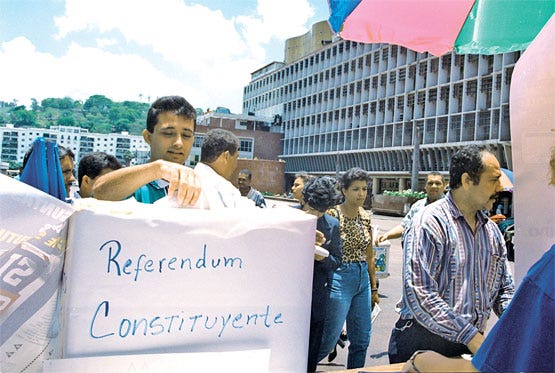
The V Republic Movement (MVR) was registered in July 1997 and the participation of Hugo Chávez as presidential candidate became official.
Once the Bolivarian program gained solidity among the popular bases, after its foundations were discussed throughout the country, making the opportunity for Chávez’s triumph more evident, then
“The Communist Party decided to leave the government (they supported the administration of Rafael Caldera) and announce, without us having requested it, that it supported me (…) Then La Causa R, the MAS (Movement Toward Socialism) and the MEP (People’s Electoral Movement ) they did the same,” Chávez reminded Ramonet.
Fracture with the PPT and its consequences in the National Assembly
In the year 2000, Venezuela was going to its third consecutive year of elections, after Chávez’s presidential triumph and the approval of the Constitution that gave birth to the Fifth Republic. In these elections, the executive and legislative branches of all levels were re-legitimized (meaning new elections at all levels) also at the national level.
Chávez considered it essential to obtain an absolute majority in the National Assembly because it would determine the composition of other powers (Prosecutor’s Office, TSJ, electoral power and moral power).
However, from within the alliances between the MVR, PPT, PCV, MEP and a faction of the MAS, a dispute occurred over the positions that could be reached and the possibility of a solid consensus went overboard.
Eventually the PPT left the alliance. It did not launch another presidential candidate, but it ran on its own in the election of governorships, mayors and deputies to parliament. The result was catastrophic: the Bolivarian and Chavista forces did not win a decisive majority in parliament.
On that event, Chávez reflected in an interview with Marta Harnecker in 2002:
“That space left by the PPT was occupied by the MAS (a party that had already split from Chavismo). Unfortunately, not a few of the people who entered the National Constituent Assembly turned out to be people with good ideological and political consistency. There you have (Leopoldo) Puchi and (Felipe) Mujica who are true political businessmen. We are now in a National Assembly with great weaknesses and this situation is weighing heavily. There are about 20 very good PPT cadres who should be deputies.”
Betrayal of Luis Miquilena and resignation of Pablo Medina from the PPT
Chávez delegated to Luis Miquilena the direction of the Ministry of Interior and Justice. He held that position until his political break with Chavismo. This leader associated with the left was in the ranks of the PCV, was an ally of the government of Isaías Medina Angarita and opposed the dictatorship of Marcos Pérez Jiménez. When he met Chávez in Yare prison, he had already retired from politics.
The influence he exerted in the few years that he accompanied the Chávez government, explained the Commander, cannot be understood without examining the origins of the relationship between the two. In the years when the Bolivarian movement was downplayed by traditional left-wing parties, Chávez found greater sympathy in the military and people who were not part of any party, including Miquilena.
He played a key role in articulating unity in the 1998 presidential campaign and later in the constituent campaign. Later on, the differences with Chávez’s country project became irreconcilable.
Some time later, he came to ask the president to retract the enabling laws (2001), a demand that was also made by the Venezuelan opposition.
“Friendships, interests, perhaps pressures, perhaps age, I don’t know how many factors were influencing that human being,” said Chávez, analyzing the outcome.
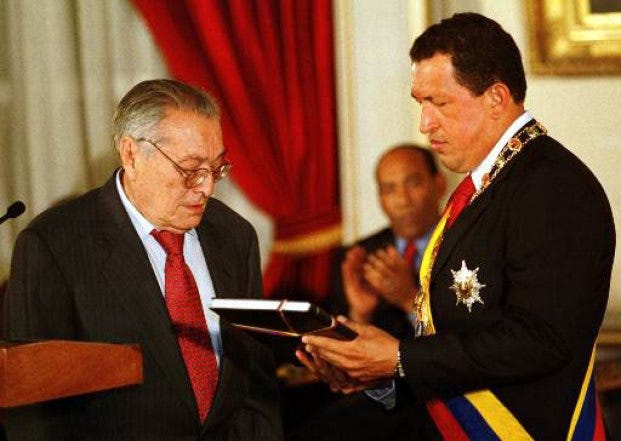
Pablo Medina formed the PPT party after moving away from La Causa R and its leader Andrés Velásquez in 1997. His relationship with Chávez was discontinuous, without really consistent support, although the party was present in the alliance that led to the Chavez victory in 1998.
The attitude was sharpening in the following campaigns of mayors and governorships. There were several clashes against the MVR candidates, during rallies in which Pablo Medina was present, which made Chávez respond with harsh statements about the behavior of the PPT.
Medina separated from the party and his face was one of those that appeared in Miraflores, when the coup d’état of April 2002 was carried out, a coup plotted in the White House.
“He completely lost his bearings,” said Chávez , “fortunately there is a group of fighters like Aristóbulo and many others who hold high the flag of La Causa R, the party founded by Alfredo Maneiro.”
Chávez: “Political parties for me are like rehearsals”
Like almost any year since Chavismo came to power, 2006 was an electoral period. Two antagonistic models faced each other for the election to the presidential office. Chávez had been ratified in the 2004 referendum and the Bolivarian project had turned towards a program of transition to socialism, which took on international historical references, but also kept its roots in national history.
The 2006 presidential victory was the most resounding of Chavismo. The candidate of the right, Manuel Rosales, was fully identified with the Venezuelan oligarchy and with Washington’s interest in taking out of the game a leader who was driving Latin American integration and alliances with the Eurasian bloc.
From this consolidation of the Chavista forces, all the partisan actors who accompanied it benefited. Parties like the PPT, PCV and Podemos (derived from the MAS sectors that supported Chávez) increased their electoral flow considerably.
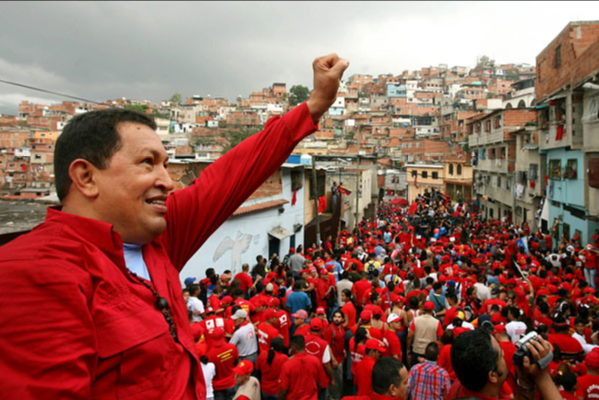
From then on, the configuration of a new stage of government began, which included the transfer of greater instruments of power to the people. In this framework, Chávez announced the consultation for constitutional reform.
Hence, there were proposals related to the restructuring of political-territorial entities that encountered resistance within the structures of a state still marked by a pro-elite structure.
At the same time, minority organizations and larger currents were summoned to form the United Socialist Party of Venezuela (PSUV).
Why did Chávez call for the rehearsal of a great party that would bring together Chavismo? In an address on April 19, 2007, he said:
“The masses generally acquire a temporary, fleeting character, many times the masses are amorphous (…) the mass is sometimes formed in a second, but just as it was formed in a second, it also disappears in a second, says Elías Canetti, in an excellent analytical essay, on the masses and the multitude and the people and popular power (…) we have seen here in Venezuela the spontaneous, explosive emergence of the masses, which just as they appeared, disappeared, without a defined objective, something like this happened on 27 February 1989 (…) This is Canetti’s thesis, but I share it: ‘The crowd will never die’, the crowd is the organized people, organically united, linked for different reasons. The party must help the people grow and become a thousand crowds, never die, conscious crowds, overwhelming crowds when they have to be,
However, the PPT, PCV and Podemos showed their disagreement with the project and decided not to dissolve.
On the other hand, in the defeat of the constitutional reform of 2007, although framed in a color revolution led by upper-class student movements that were trained by the Serbian organization CANVAS with funding from USAID, also contributed to the fracture with “Podemos”, a party that campaigned against reform.
The course that Podemos followed was to support opposition candidates in 2008 (governor’s and mayoral elections) and to enroll in the anti-Chavista coalition of the Democratic Unity Table (MUD) in 2009. In 2012, at the request of a sector of its members, the Supreme Court of Justice appoints an ad hoc board and the party returns to the Great Patriotic Pole (GPP).
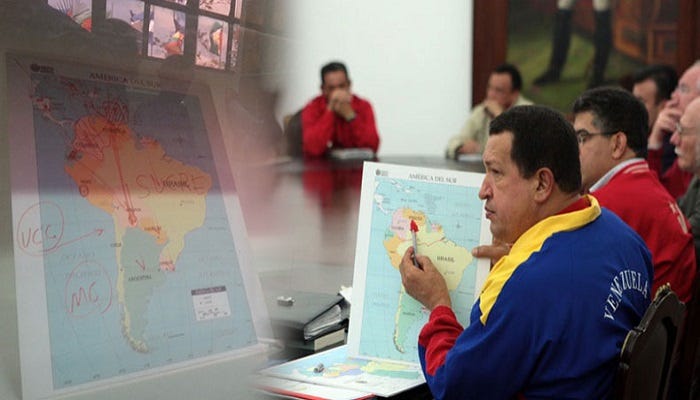
The intention that the left forces go together to the regional elections of 2008 responded to a strategic objective that Chávez identified and explained in May of that year: the opposition should not be given the opportunity to obtain a victory in the “Media Luna”, (the half moon area of Zulia, Táchira, Mérida, Barinas and Apure states), as this would mean giving up an enclave that would serve coup operations in the country by way of secessionism.
Separatism “a la Bolivia … A la Kosovo”, said the president in that speech, while in parallel his Bolivian counterpart, Evo Morales, was precisely neutralizing an offensive plan of this type, led by the extreme right in Santa Cruz, which months later resulted in the expulsion of the US ambassador, Phillip Goldberg, for having financed the coup plotters.
During the course of the year, the process of selecting candidates for the November elections in Venezuela was discussed with the allied parties.
There were two cases of divisions of the PPT and PCV that Chávez strongly criticized. The first was Lenny Manuitt, who, when he participated in the PSUV primary elections seeking the candidacy of the Guárico state, lost against William Lara and decided to go on his own, with the support of the PPT, ultimately dividing the Chavista vote.
The other case occurred with the selection of the candidate from the Trujillo state. The PSUV rules establish that in order to win the primaries, the candidates must have more than 50% of the votes. Neither Hugo Cabezas (24%) nor Octavio Mejías (27.7%) got the required percentage, therefore, according to the regulations, the final selection corresponded to the party leadership. The PSUV elected Hugo Cabezas and then Mejías launched independently, backed by the PCV and the PPT.
Later, the PPT was presented as an “alternative to polarization” in the 2010 parliamentary elections.
The case of Joaquín Pérez Becerra
The Colombian journalist Joaquín Pérez Becerra, requested by Interpol with a red code for his alleged affiliation with the FARC-EP, arrived in Caracas at the end of April 2011 without the Venezuelan government having been notified.
Then, President Chávez, in compliance with international treaties, made contact with the government of Juan Manuel Santos to deport Pérez Becerra, within the framework of a plan to repair bilateral relations damaged by the management of Álvaro Uribe Vélez, that tried to force a warlike conflict between the two countries.
The Venezuelan government revealed that the event could be an ambush to involve it with the support of groups recognized as “criminals” by international authorities. Pérez Becerra, who had Swedish nationality, could be arrested at European airports, but neither in Sweden nor in Germany was the International Police alert triggered. “Each one should assume its responsibility,” said Chávez to settle the matter.
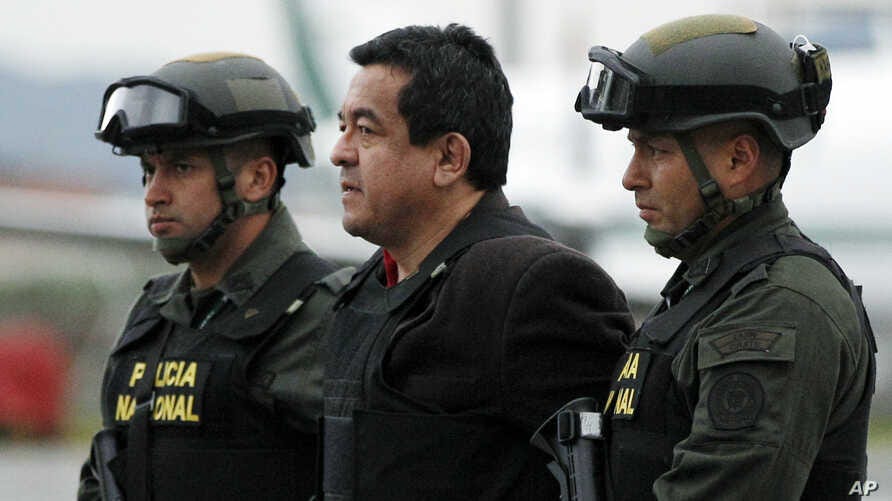
In response to the government’s actions, the PCV accused him of committing a “legally illegal act for the kidnapping and surrender” of Joaquín Pérez Becerra. He added that this would “weaken” the unity of Chavismo “with a view to the necessary victorious electoral route for 2012”.
Let’s remember 2017
How do you stop a wave of mercenary violence that threatens to devour an entire country? President Nicolás Maduro found the way to restoring political and social peace in the convocation of a National Constituent Assembly (ANC).
That year three elections were held: the ANC, the governor’s office and the mayoral elections.
The moment deserved national cohesion, in rejection of the months of street riots, hate crimes and attacks on the symbols of the nation that were led by radical sectors of anti-Chavismo.
The PCV, PPT and MEP parties supported the candidacy of former trade minister Eduardo Samán, in opposition to the PSUV candidate, Erika Farías, in the mayoral elections of Caracas, the country’s capital and the nerve center of political power. The PPT presented candidates to the fifteen mayoralties of the Guárico state, and there were minor divisions by mayoralties in other states.
However, the divisive positions had no major effect. The results of each of the elections expressed the desire of Venezuelans to resolve conflicts through constitutional channels. More than 8 million people elected the members of the ANC; the Great Patriotic Pole won 18 governorships and 305 mayors (the vast majority of PSUV candidates).
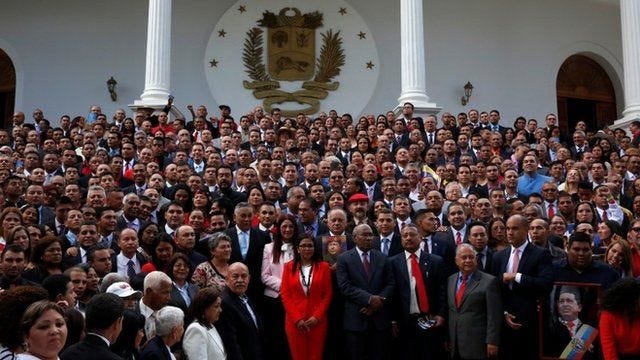
Once again, some parties of the Venezuelan left were unable, under these conditions of the siege of the Republic, to repress the conduct that, as we saw during the years of the government of Hugo Chávez, caused setbacks in the Bolivarian Revolution.
Featured image: Photo by Alejandro Cegarra / AP.
Translation: OT/JRE/EF

Misión Verdad is a Venezuelan investigative journalism website with a socialist perspective in defense of the Bolivarian Revolution